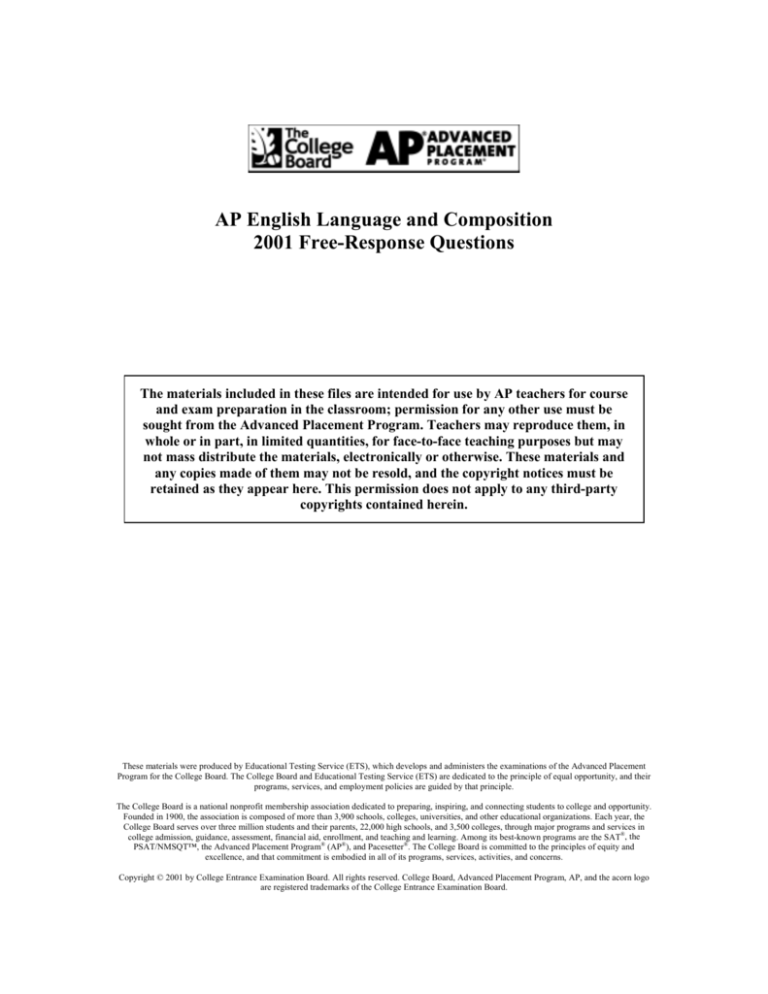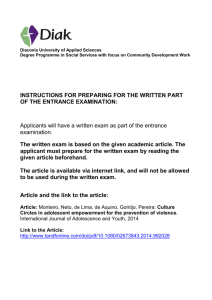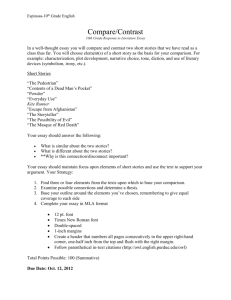
AP English Language and Composition
2001 Free-Response Questions
The materials included in these files are intended for use by AP teachers for course
and exam preparation in the classroom; permission for any other use must be
sought from the Advanced Placement Program. Teachers may reproduce them, in
whole or in part, in limited quantities, for face-to-face teaching purposes but may
not mass distribute the materials, electronically or otherwise. These materials and
any copies made of them may not be resold, and the copyright notices must be
retained as they appear here. This permission does not apply to any third-party
copyrights contained herein.
These materials were produced by Educational Testing Service (ETS), which develops and administers the examinations of the Advanced Placement
Program for the College Board. The College Board and Educational Testing Service (ETS) are dedicated to the principle of equal opportunity, and their
programs, services, and employment policies are guided by that principle.
The College Board is a national nonprofit membership association dedicated to preparing, inspiring, and connecting students to college and opportunity.
Founded in 1900, the association is composed of more than 3,900 schools, colleges, universities, and other educational organizations. Each year, the
College Board serves over three million students and their parents, 22,000 high schools, and 3,500 colleges, through major programs and services in
college admission, guidance, assessment, financial aid, enrollment, and teaching and learning. Among its best-known programs are the SAT®, the
PSAT/NMSQT™, the Advanced Placement Program® (AP®), and Pacesetter®. The College Board is committed to the principles of equity and
excellence, and that commitment is embodied in all of its programs, services, activities, and concerns.
Copyright © 2001 by College Entrance Examination Board. All rights reserved. College Board, Advanced Placement Program, AP, and the acorn logo
are registered trademarks of the College Entrance Examination Board.
2001 AP® ENGLISH LANGUAGE AND COMPOSITION
FREE-RESPONSE QUESTIONS
ENGLISH LANGUAGE AND COMPOSITION
SECTION II
Total time—2 hours
Question 1
(Suggested time—40 minutes. This question counts one-third of the total essay section score.)
The letter below was written in 1866 by the English novelist Marian Evans Lewes (who used the pen name
George Eliot) in response to a letter from an American woman, Melusina Fay Peirce.
Read the letter carefully. Then write an essay in which you analyze the rhetorical strategies Lewes uses to
establish her position about the development of a writer.
My dear Madam
Line
5
10
15
20
25
30
35
I do not usually answer letters unless they demand
an answer, finding the days too short for much correspondence; but I am so deeply touched by your words
of tenderness and by the details you tell me about
yourself, that I cannot keep total silence towards you.
My consciousness is not of the triumphant kind
your generous joy on my behalf leads you to imagine.
Exultation is a dream before achievement, and rarely
comes after. What comes after, is rather the sense
that the work has been produced within one, like
offspring, developing and growing by some force
of which one’s own life has only served as a vehicle,
and that what is left of oneself is only a poor husk.
Besides, the vision of something that life might be
and that one’s own ignorance and incompleteness
have hindered it from being, presses more and more
as time advances. The only problem for us, the only
hope, is to try and unite the utmost activity with the
utmost resignation. Does this seem melancholy?
I think it is less melancholy than any sort of selfflattery.
I want to tell you not to fancy yourself old because
you are thirty, or to regret that you have not yet
written anything. It is a misfortune to many that they
begin to write when they are young and give out all
that is genuine and peculiar in them when it can be
no better than trashy, unripe fruit. There is nothing
more dreary than the life of a writer who has early
exhausted himself. I enter into those young struggles
of yours to get knowledge, into the longing you feel
to do something more than domestic duties while yet
you are held fast by womanly necessities for neatness
and household perfection as well as by the lack of
bodily strength. Something of all that I have gone
through myself. I have never known perfect health,
and I have known what it was to have close ties
40
45
50
55
60
making me feel the wants of others as my own and to
have very little money by which these wants could be
met. Before that, I was too proud and ambitious to
write: I did not believe that I could do anything fine,
and I did not choose to do anything of that mediocre
sort which I despised when it was done by others.
I began, however, by a sort of writing which had no
great glory belonging to it, but which I felt certain
I could do faithfully and well. This resolve to work
at what did not gratify my ambition, and to care only
that I worked faithfully, was equivalent to the old
phrase—“using the means of grace.” Not long after
that, I wrote fiction which has been thought a great
deal of—but the satisfaction I have got out of it has
not been exactly that of ambition. When we are young
we say, “I should be proud if I could do that.” Having
done it, one finds oneself the reverse of proud.
I will say no more about myself except that you
must not imagine my position to be at all like
Romola’s.1 I have the best of husbands, the most
sympathetic of companions; indeed, I have more than
my share of love in a world where so many are pining
for it. Mr. Lewes,2 who cares supremely for science,
is interested in what you say of your husband’s
labours; and he is so delighted when anything good or
pretty comes to me that I think he is more grateful to
you than I am for your generous, affectionate words.
Yet I too am not insensible, but shall remain always
Yours in grateful memory
M. E. Lewes.
1 Romola: the isolated, unhappily married main character in one of
Eliot’s novels
2 Mr. Lewes: Eliot’s common-law husband, a prominent philosopher
Copyright © 2001 by College Entrance Examination Board. All rights reserved.
Advanced Placement Program and AP are registered trademarks of the College Entrance Examination Board.
GO ON TO THE NEXT PAGE.
2
2001 AP® ENGLISH LANGUAGE AND COMPOSITION
FREE-RESPONSE QUESTIONS
Question 2
(Suggested time—40 minutes. This question counts one-third of the total essay section score.)
Carefully read the following passage from “Owls” by Mary Oliver. Then write an essay in which you analyze
how Oliver’s style conveys the complexity of her response to nature.
Line
5
10
15
20
25
30
35
When the great horned [owl] is in the trees its
razor-tipped toes rasp the limb, flakes of bark fall
through the air and land on my shoulders while
I look up at it and listen to the heavy, crisp, breathy
snapping of its hooked beak. The screech owl I can
imagine on my wrist, also the delicate saw-whet that
flies like a big soft moth down by Great Pond. And
I can imagine sitting quietly before that luminous
wanderer the snowy owl, and learning, from the white
gleam of its feathers, something about the Arctic. But
the great horned I can’t imagine in any such proximity
—if one of those should touch me, it would be to the
center of my life, and I must fall. They are the pure
wild hunters of our world. They are swift and
merciless upon the backs of rabbits, mice, voles,
snakes, even skunks, even cats sitting in dusky yards,
thinking peaceful thoughts. I have found the headless
bodies of rabbits and bluejays, and known it was the
great horned owl that did them in, taking the head
only, for the owl has an insatiable craving for the taste
of brains. I have walked with prudent caution down
paths at twilight when the dogs were puppies. I know
this bird. If it could, it would eat the whole world.
In the night, when the owl is less than exquisitely
swift and perfect, the scream of the rabbit is terrible.
But the scream of the owl, which is not of pain and
hopelessness, and the fear of being plucked out of
the world, but of the sheer rollicking glory of the
death-bringer, is more terrible still. When I hear it
resounding through the woods, and then the five black
pellets of its song dropping like stones into the air,
I know I am standing at the edge of the mystery, in
which terror is naturally and abundantly part of life,
part of even the most becalmed, intelligent, sunny life
—as, for example, my own. The world where the owl
40
45
50
55
60
65
is endlessly hungry and endlessly on the hunt is the
world in which I live too. There is only one world.
Sometimes, while I have stood listening to the
owl’s auguring song drifting through the trees, when
it is ten degrees above nothing and life for any small
creature is hard enough without that, I have found
myself thinking of summer fields. Fields full of
flowers— poppies or lupines. Or, here, fields where
the roses hook into the dunes, and their increase is
manyfold. All summer they are red and pink and
white tents of softness and nectar, which wafts and
hangs everywhere— a sweetness so palpable and
excessive that, before it, I’m struck, I’m taken, I’m
conquered, I’m washed into it, as though it was a
river, full of dreaming and idleness—I drop to the
sand, I can’t move; I am restless no more; I am
replete, supine, finished, filled to the last edges with
an immobilizing happiness. And is this not also
terrible? Is this not also frightening?
Are the roses not also— even as the owl is—
excessive? Each flower is small and lovely, but in
their sheer and silent abundance the roses become an
immutable force, as though the work of the wild roses
was to make sure that all of us who come wandering
over the sand may be, for a while, struck to the heart
and saturated with a simple happiness. Let the mind
be teased by such stretches of the imagination, by
such balance. Now I am cringing at the very sound of
the owl’s dark wings opening over my head—not
long ago I could do nothing but lounge on the sand
and stare into the cities of the roses.
Excerpt from “Owls” in BLUE PASTURES, copyright © 1995,
1992, 1991 by Mary Oliver, reprinted by permission of Harcourt, Inc.
Copyright © 2001 by College Entrance Examination Board. All rights reserved.
Advanced Placement Program and AP are registered trademarks of the College Entrance Examination Board.
GO ON TO THE NEXT PAGE.
3
2001 AP® ENGLISH LANGUAGE AND COMPOSITION
FREE-RESPONSE QUESTIONS
Question 3
(Suggested time— 40 minutes. This question counts one-third of the total essay section score.)
Carefully read the following passage by Susan Sontag. Then write an essay in which you support, refute, or
qualify Sontag’s claim that photography limits our understanding of the world. Use appropriate evidence to develop
your argument.
Line
5
10
15
20
Photography implies that we know about the world
if we accept it as the camera records it. But this is the
opposite of understanding, which starts from not
accepting the world as it looks. All possibility of
understanding is rooted in the ability to say no.
Strictly speaking, one never understands anything
from a photograph. Of course, photographs fill in
blanks in our mental pictures of the present and the
past: for example, Jacob Riis’s images of New York
squalor in the 1880’s are sharply instructive to those
unaware that urban poverty in late-nineteenth-century
America was really that Dickensian. Nevertheless, the
camera’s rendering of reality must always hide more
than it discloses. As Brecht points out, a photograph
of the Krupp works* reveals virtually nothing about
that organization. In contrast to the amorous relation,
which is based on how something looks, understanding
is based on how it functions. And functioning takes
place in time and must be explained in time. Only that
which narrates can make us understand.
25
30
35
The limit of photographic knowledge of the world
is that, while it can goad conscience, it can, finally,
never be ethical or political knowledge. The knowledge
gained through still photographs will always be some
kind of sentimentalism, whether cynical or humanist.
It will be a knowledge at bargain prices—a semblance
of knowledge, a semblance of wisdom. . . .The very
muteness of what is, hypothetically, comprehensible
in photographs is what constitutes their attraction and
provocativeness. The omnipresence of photographs
has an incalculable effect on our ethical sensibility.
By furnishing this already crowded world with a
duplicate one of images, photography makes us feel
that the world is more available than it really is.
Needing to have reality confirmed and experience
enhanced by photographs is an aesthetic consumerism
to which everyone is now addicted. Industrial
societies turn their citizens into image-junkies; it is
the most irresistible form of mental pollution.
—On Photography, 1977
* Krupp: a German weapons manufacturing firm that was instrumental in
the Nazi rearmament effort of the 1930’s.
END OF EXAMINATION
Copyright © 2001 by College Entrance Examination Board. All rights reserved.
Advanced Placement Program and AP are registered trademarks of the College Entrance Examination Board.
4




